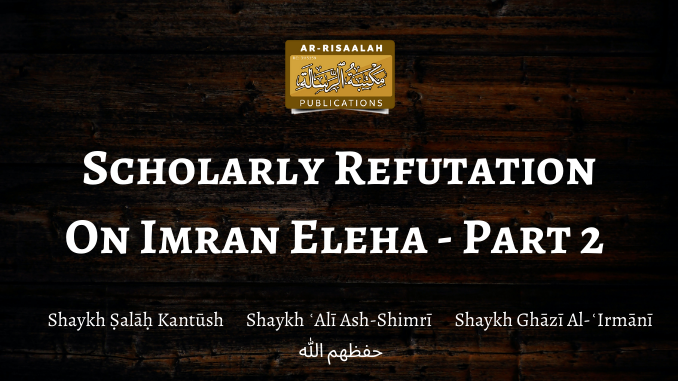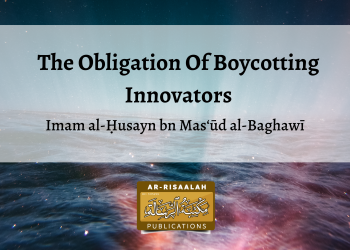Shaykh Ghāzī Al-ʿIrmānī
Wa ʿalaykum as-Salām wa raḥmatullāh wa barakātuh.
This individual is either in ignorance or misguidance—and I think he is closer to misguidance.
“Obey me as long as I obey Allāh regarding you,” is ascribed to Abū Bakr. […]
This man is misguided. May Allāh bless you.
His speech that [Shaykh] Al-Madkhalī and [Shaykh] Muḥammad Amān Al-Jāmī issued the verdict […], this is the speech of Jamāʿah Al-Ikhwān.
This man is to be abandoned and he is not to be listened to. And he should not be sitted with.
Criticizing the leaders publicly opposes the speech of the Messenger ﷺ.
“Whoever intends to advise the one in authority on a matter should not do so publicly. However, he should take him by the hand and advise him in private.”
This speech is not from being mannered.
This path is in opposition to the Sunnah of the Messenger ﷺ.
And it is established in the Glorious Book, when Allāh sent his noble messengers, Mūsá [and Hārūn] to Firʿawn, He—the Exalted and Most High—said [what means]: ﴾And speak to him mildly, perhaps he may accept admonition or fear Allah.﴿ [Ṭā Hā: 44]
And he—i.e., Firʿawn—was the one who said: ﴾”I am your lord, most high”﴿ [An-Nāziʿāt: 24]
And sincerity of purpose, and obeying and listening to those in authority, is one of the great fundamental principles of Islām. And it is from the fundamental principles of the religion. May Allāh bless you.
Shaykh Ṣalāḥ Kantūsh
Wa ʿalaykum as-Salām wa raḥmatullāh wa barakātuh.
May Allāh grant you protection and safety. This is the speech of the people of misguidance and deviation. Rather, this creed is not only the creed the two Shaykhs [i.e., Shaykh Muḥammad Amān Al-Jāmī and Shaykh Rabīʿ Al-Madkhalī], it is the creed of the righteous predecessors from the three favoured generations till this day of ours and till the Day Allāh will inherit the Earth and the heavens.
And the like of this man is corrupted and a corruptor. Do not listen to him or sit with him. May Allāh grant you success.
Shaykh ʿAlī Ash-Shimrī
Wa ʿalaykum as-Salām wa raḥmatullāh wa barakātuh.
No one speaks with this kind of speech except a man treading the path of the Khawārij or one ignorant of this being the speech of the Khawārij.
And these contemporary Khawārij lie by ascribing this speech [i.e., the prohibition of openly criticizing the leaders] to Shaykh [Muḥammad Amān] Al-Jāmī, may Allāh have mercy on him, and Shaykh Rabīʿ [Al-Madkhalī], may Allāh preserve him, and claiming that this verdict was specifically issued by both of them, out of flattering the rulers.
And this speech is utter falsehood because this is not a [mere] verdict, rather, it is one of the fundamental principles of the Sunnah recorded by the Imāms of Islām in their books, such as, As-Sunnah by Imām Aḥmad, Sharḥ As-Sunnah by Al-Barbahārī, Ash-Sharīʿah by Al-Ājurrī, Al-Ibānah by Ibn Baṭṭah, Uṣul Iʿtiqād Ahl As-Sunnah Wa Al-Jamāʿah by Al-Lālakāʾī and other than them.
And this fundamental principle was derived from the Sunnah of Allāh’s Messenger [ﷺ]. In numerous ḥadīths, the Prophet ﷺ had prohibited revolting against the ruler, and he commanded with advising the ruler, however, with the condition of this advice not being in the open, and not inciting the people’s hatred of him, due to what stems out of it of evils.
Imām Aḥmad related a ḥadīth of Allāh’s Messenger ﷺ in his Musnad, where he said:
“Whoever intends to advise the ruler on a matter should not do so publicly. However, he should take him by the hand and advise him in private. If he accepts [the advice] from him, that is good. If he does not accept it, he has fulfilled his duty upon him.”
And whoever refers back to the books of Ibn Taymiyyah and Ibn Al-Qayyim, may Allāh have mercy on them, will find that clearly.
Likewise, our contemporary scholars, both the living and the dead, such as Ibn Bāz, Ibn ʿUthaymīn, Al-Albānī, Al-Luḥaydān, Abdul-ʿAzīz Āl Ash-Shaykh, Al-Fawzān, Muḥammad Amān Al-Jāmī, Al-Ithyūbī, Rabīʿ, Al-Jābirī, and other than them, have sufficiently clarified that.
As for the the fierce attack these contemporary Khawārij wage against Shaykh Rabīʿ Al-Madkhalī and Shaykh Al-Jāmī because they refuted these misguided methodologies, their books, and their symbolic figures, such as Sayyid Quṭb, Al-Mawdūdī, and Ḥasan Al-Bannā, and they clarified what they possessed of deviation; that is why these Khawārij targeted them, for them to reduce the value of their strong refutations which gave them sleepless nights.
As for this narration they use as evidence, it can not be used as an evidence for their falsehood for the following reasons:
1. It is very weak. After relating it, Al-Bazzār commented on it with the following:
Ismāʿīl bn Abī Khālid had narrated from Qays bn Abī Ḥāzim, who said: Abū Bakr delivered a sermon and he said: “Indeed, I have taken authority over you but I am not from the best of you. I am only human like you. So if I am right, praise Allāh and if I err, correct me. And indeed, Allāh’s Messenger ﷺ used to be protected [from errors] through the revelation.”
And this ḥadīth was narrated by Bahlūl bn ʿUbayd, from Ismāʿīl, from Qays. And we did not place it [i.e., this narration] in the Musnad of Abū Bakr because Abū Bakr only said, “Indeed, Allāh’s Messenger ﷺ used to be protected [from errors] through the revelation,” and nothing [like this] was narrated from him, because Bahlūl is not strong [in narration], even though a group of people have narrated from him.
So, we did not mention this ḥadīth because of this defect.
2. The narration was mentioned by Al-Bazzār in his Musnad, [Imām] Mālik in Al-Muwaṭṭaʾ, Muʿammar bn Rāshid, Ad-Daynūrī, and Aṭ-Ṭabarānī in Al-Awsaṭ, without this addition that they use as evidence for their falsehood. And that is their claim that one of those listening to Abū Bakr said: “Therefore, we will correct you…,” etc. This has no basis.
3. And even if it is authentic, it does not oppose the commands of the Prophet ﷺ regarding exercising patience on the ruler and the prohibition of revolting against him.











